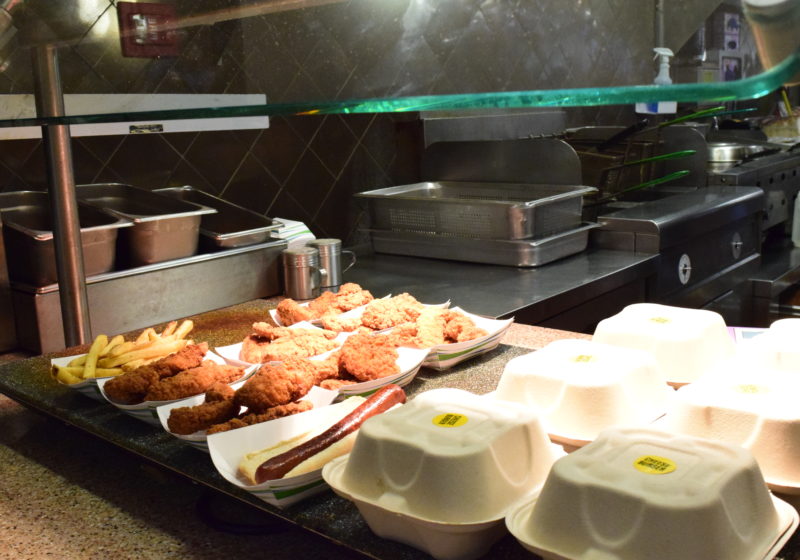Late Night, the haven for hungry insomniacs, tipsy partygoers, and stress-eating scholars, has transformed dramatically since moving from its long-standing home at the Faculty Club to the Pit.
This change was sparked by long-standing discontent, including that of the student workers at Late Night.
——
Last semester, the Campus Times interviewed two student workers for Late Night, junior Hanyia Ahmed and senior Gabrielle Bowen, about their concerns with the old Late Night. Ahmed had been working in Late Night two semesters, Bowen for three and a half at Late Night, four in Dining as a whole.
Neither were fully prepared to deal with the challenges of working at Late Night, even though both had had experience working with UR Dining Services.
“When I first got the job, it was tough,” Bowen said. “I don’t think people understand how intense it is. It’s so demanding that some of the other student workers literally just don’t come back.”
The job required them to take down orders from customers, report the orders to the chefs, and give the food to the students. A major stressor for these workers was the fast-paced nature of their job.
Oftentimes, neither the students nor the chefs could keep up with the enormous amount of orders coming in at once. Ahmed described how often the counter would be filled with three rows of order tickets, with roughly 20 tickets per row.
The Late Night crunch came in waves, depending on the hour, the day, or the season, Bowen explained.
“When it’s hot outside, and there are parties, and people don’t have work to do, the orders go [through] the roof. The beginning of fall semester, that’s the craziest time,” Bowen said. “People have Declining to burn, they have alcohol that they’ve had, drugs that they’ve had, and we have greasy food that will absorb whatever things you’ve consumed.”
The waves could get so intense that workers would receive 30-60 orders in a single minute on Tapingo (the mobile ordering service replaced this year by Grubhub). “At 10:30 p.m. or 11:00 p.m., the Tapingo box is still printing orders from 9:00 p.m. because so many people ordered at once,” Ahmed said.
On top of that, Ahmed and Bowen said they regularly experienced rude behavior on the part of impatient, hungry crowds of students.
Much of the wait time was unavoidable, but students could direct their anger at the workers.
Ahmed and Bowen can list off numerous incidents where belligerent customers refused to listen. Like a disgruntled student who argued with Ahmed about the new extra price for sauce. “I agree, like, if I wasn’t working behind the counter, I understand why those students are angry,” Ahmed said. “But they have to understand that we’re not the ones making the rules.”
One policy change — that Late Night workers had to take orders until closing time — especially displeased Bowen and Ahmed. The backload of orders at closing time forces all the Late Night staff to work overtime, without getting paid. Bowen recalled sometimes leaving at almost 3 a.m.
“This is not what we signed up for. Not to mention, getting home is very difficult past 2 a.m. Both of our bus lines stop by 2. Our last resort is SafeRide, which takes anywhere from 10 to 60 minutes,” Bowen said. Ahmed agreed, saying that she has also waited an hour to get home.
The harassment that Late Night workers experienced was not limited to discontent over the food and the wait times. One time, Bowen recalled, two drunk male students made comments to her about her body.
She reported the sexual misconduct to her manager — who didn’t tell anybody. So Bowen made a post on Facebook, ranting about the treatment she received.
“Stop hitting on me for favors. Stop rudely checking me out at work. Stop disrespecting me and the other student workers,” Bowen wrote. “We deadass have class with some of y’all, how dare y’all be so goddamn rude.”
Bowen told CT that someone who saw Bowen’s post screenshotted and sent it to her bosses.
The intent, Bowen said, was to have her fired.
——
These issues are not isolated to Late Night, according to Ahmed.
“It’s an issue with every food service place on campus. They don’t get respected,” Ahmed said. “You see people angry at 9 a.m. in Starbucks lines. You know that it’s 9 a.m. and it’s Starbucks. You should not be angry.”
Bowen and Ahmed disapproved of the disrespect that Dining Service workers as a whole, not just the students, receive.
“I think a large part of that has to do with the fact that the majority of the staff are people of color that are from Rochester,” Bowen said. “People talk down to the workers as if they don’t have education, which they do, like they don’t have families, which they do, like they don’t take care of themselves, like they do.”
Dining Staff are in also in a tougher position than Ahmed and Bowen. “They can’t speak out like we can, they can’t just talk to the Campus Times and give an interview like this, they’d get fired,” Ahmed said.
After Bowen’s Facebook post, management told her that, to them, it seemed as though she was “threatening violence,” Bowen said. “I am absolutely certain that if I were a white woman making these comments, people would not feel as though I was being an angry, aggressive black woman.”
The management staff were concerned over a specific part of Bowen’s post, which said, “Y’all deadass be bugging like I won’t roll up on you in the tunnels and tell y’all what’s really good.”
Her intention was not to threaten students, Bowen said. “I don’t have time to do something as dumb as that. What I’m saying is that I know you, and do you treat the people that you know this way?”
This conversation with management when they were investigating her Facebook post was the first time that Bowen, who had worked for Dining Services for two years, had spoken with higher management.
“The issue is that management cares more about the student customers than the workers,” Bowen said.
Cam Schauf, Director of Campus Dining Services and Auxiliary Operations, told the Campus Times last semester that Dining was aware of the concerns and has sent the Douglass Culinary Director, Douglass Chefs, and the Douglass Hospitality Director to work in Late Night over the course of last semester to “evaluate how the operation was running and implement new procedures to address areas of concern.”
Ahmed and Bowen both cited a meeting that was canceled and never rescheduled as an example of management not actively trying to reach out to their student employees.
Schauf responded by stating,“The senior management in Douglass are open, caring and responsive individuals who volunteered to come in during Late Night, in addition to their regular work hours, to make sure that we were doing everything that we can to make it a safe and friendly place for both workers and customers.”
He attributed the missed meeting to “a mix-up in communication” and “scheduling issues,” promising to contact the students again. As of the time of publication, both Bowen and Ahmed hold that the meeting was never rescheduled.
——
Many of the concerns brought up by Ahmed and Bowen are why Late Night moved locations to the Pit, Schauf said. The Pit has a bigger fryer to keep up with the high food demand, plus more cooking space in general, allowing for a larger menu. It also has more accessible restrooms and more seating than the Douglass space.
“Our belief is that the changes will remove a lot of the frustration that was generated by overcrowding and long wait times,” Schauf said. “In addition, we are always working with our management team on how to address difficult situations and make things better for our customers and our employees.”
A major difference between the old Late Night and the new is that there are no more student workers at Late Night; it is completely staffed by the Pit workers, who are Dining Staff. Both Ahmed and Bowen were notified of the change months in advance, and they have since found new jobs on campus.
“I don’t think people misbehave as much with the Pit workers as they used to with us,” Ahmed said.
She agrees that the change has reduced crowding, but she had noticed that the food was already mostly pre-made, ready for pick up, whereas before Late Night was exclusively made-to-order. Ahmed also missed the atmosphere of Late Night, and the camaraderie of the staff.
Regarding the change from the made-to-order format, Schauf said that “it is always our intent to cook food to order, as much as possible, while serving our customers in a timely manner. This means that there is often a mix of cooking ahead while preparing for the busy periods and cooking to order.”
Other diners at Late Night have expressed differing opinions of the change. Most first-years said that they enjoyed the food, like Sabeet Kazmi, who wasn’t entirely sure what Late Night was, but thought the food was “much better than Douglass’ food.”
For juniors Ruthie Seabolt and Juliana Greene, however, Late Night was not the same.
“It was definitely better last semester. This is like just what you get during the day at the Pit,” Seabolt said.
Greene agreed, adding that, “Here [at the Pit] it’s a little bit faster, yes, but you can’t order ahead.”
Joe Williams, a Pit worker at the Wok, thought that the move was a great idea. “We have better wings, you get faster service, we have more variety […] Late Night has made the Pit sales go up.”
For Bowen, she is glad of the change to a better-suited place. But, to her, the change doesn’t get to the heart of the issue.
“Changing the space won’t change how students speak to and treat the Dining Staff,” Bowen wrote in an email to CT. “I care about respect for the workers. Respect that’s given regardless of how long their food takes to prepare and where it’s prepared.”





